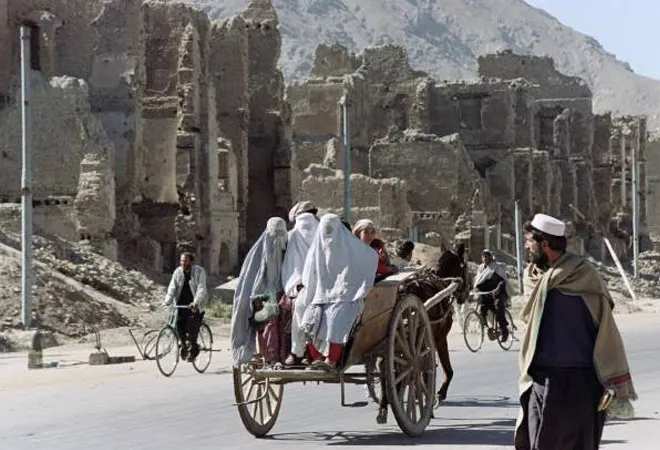-
CENTRES
Progammes & Centres
Location
Despite glaring evidence of women's rights violations in Afghanistan, the international community remains silent.

It has been a year since the Taliban re-established their control in Afghanistan, forming an interim government that filled the vacuum left behind by the hasty withdrawal of the United States’ forces and the fall of the previous government. Despite the group’s promises of reform this time around—which offered a stark deviation from its well-known horrendous human rights record in the late 1990s—little seems to have changed, especially in terms of their attitude towards women and girls.
Rolling back much of the rights and freedoms enjoyed by Afghan women over the past decade, the Taliban has instead created huge barriers to their health and education, curtailed movement, freedom of expression and association, and deprived many of their livelihoods. For most Afghan women and girls, almost every passing day since 15 August 2021—when the Islamist group took over Kabul—has brought a deterioration in their rights, condition, and socio-political status.
Rolling back much of the rights and freedoms enjoyed by Afghan women over the past decade, the Taliban has instead created huge barriers to their health and education, curtailed movement, freedom of expression and association, and deprived many of their livelihoods.
Meanwhile, many countries across the globe have issued statements, expressed deep concern, and condemned the Taliban’s action whilst calling upon them to end their systematic violations of women’s rights. However, so far, the international community has devised no concrete, coordinated, and practical action to ensure the protection of Afghan women and girls. Put simply, the global response to the situation of women and girls in Afghanistan, in the past year, has remained rather lukewarm and perhaps, extremely inadequate.
Even countries such as Sweden, Canada, and France—which have pledged to have a feminist foreign policy and are staunch advocates of the United Nations’ (UN) Women, Peace and Security Agenda—have not adopted a more proactive approach to opposing Taliban’s policies, nor have they made the rights of Afghan women and girls a major priority in their foreign policy.
The UN system, whose main purpose is to maintain international peace and security and protect human rights, has also done little to save Afghan women from the Taliban. For instance, in August 2021, a special session of the UN Human Rights Council on Afghanistan was organised, and despite the emerging evidence from the ground repeatedly highlighting the Taliban’s rollback on women’s rights, the session culminated with mere statements of concern.
Meanwhile, in the October session, the position of a special rapporteur on human rights in Afghanistan was created. Though this was considered a positive step, the need of the hour demanded the development of a more robust mechanism in the form of an independent fact-finding mission, or commission of an inquiry that investigated the Taliban’s repressive policies, ensuring justice to the Afghan women and girls.
The UN system, whose main purpose is to maintain international peace and security and protect human rights, has also done little to save Afghan women from the Taliban.
Then in March, the Security Council renewed the mandate of the UN mission in Afghanistan for “the promotion of the human rights of all Afghans and to support and promote gender equality, women’s and girl’s empowerment and the full protection of their rights.” The mandate also assigned the mission the responsibility to monitor the violations of women’s rights. However, despite its usefulness, there remains little evidence to prove that the mission has been able to achieve any of these goals.
In June, the Security Council, on one hand, imposed travel bans on two Taliban representatives complicit in restricting women’s access to education and on the other, renewed travel ban exemption for 13 other Taliban leaders. However, punishing a few representatives of the group through the imposition of travel bans will neither help in solving the bigger problem of mass violations of women’s rights nor will it help in discouraging the group to end atrocities against Afghan women and girls. At the end of the day, the entire group is responsible for deteriorating the lives of women, affecting all aspects of their human rights.
Furthermore, the Human Rights Council also called for an urgent debate on the plight of women and girls in Afghanistan in July, which provided a platform to hear statements directly from Afghan women. However, instead of devising policies and actions that included these diverse voices and mainstreamed women’s concerns and needs in response strategies, once again, the debate ended up with only one concrete step, which called for an enhanced interactive dialogue at the Council’s next session in September.
It is fair to state that the international community’s response—to address women’s rights and empowerment issues in Afghanistan—has remained rather uncoordinated and lacking in urgency. With no action being taken against the Islamist fundamentalists, the crisis for women and girls in Afghanistan will only continue to escalate with no end in sight. Although there is no easy solution to this problem, given that the Taliban has been and continues to be very resistant to pressure, the global consensus on issues as fundamental as women’s rights demands an aggressive response.
With no action being taken against the Islamist fundamentalists, the crisis for women and girls in Afghanistan will only continue to escalate with no end in sight.
Thus, countries around the world should take a much stronger stand, coordinating closely with each other, using all mechanisms and measures available including travel bans and other sanctions against Taliban leaders to protect as well as uphold the fundamental rights of the Afghan women. Perhaps, the Human Rights Council session, which is scheduled to take place in September, can be used as a platform to bring about concrete steps that demonstrate much stronger commitments by countries to protect the rights of Afghan women and girls, and help in ensuring accountability for violations of their rights.
And lest we forget, to truly act with and for the Afghan women, as well as for the development of a better country, the international community must hear women’s voices, understand their needs and priorities, and embrace their hopes for their future.
The views expressed above belong to the author(s). ORF research and analyses now available on Telegram! Click here to access our curated content — blogs, longforms and interviews.

Akanksha Khullar is a Visiting Fellow with the ORFs Strategic Studies Programme where her work focuses on the intersection of policy advice and academic research ...
Read More +